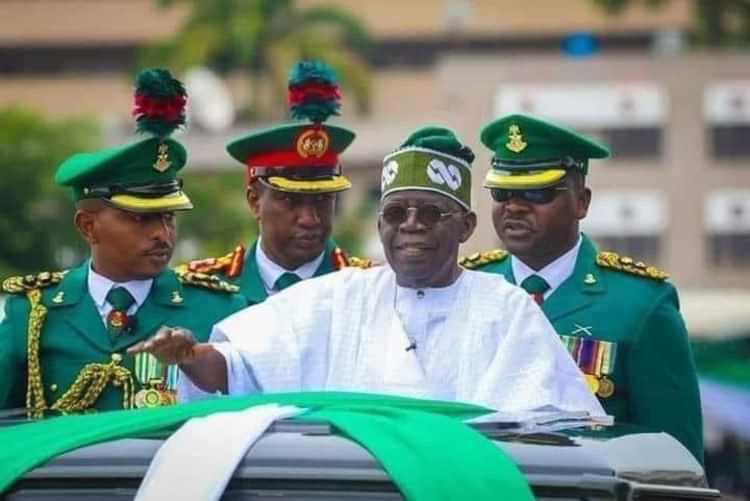By Terrain De Dieu 
 WARNING: Article may contain sensitive content
WARNING: Article may contain sensitive content DISCLAIMER: It is important to note that the views expressed in this article are solely those of the author, and do not necessarily reflect those of fielyinfo.blogspot.com or any other individual or organization. Furthermore, no claim made in this article should be taken as an endorsement or accusation against Ahmed Bola Tinubu; rather they should be seen as opinions intended to spark dialogue on difficult issues facing Nigeria today. Readers are therefore advised that some information presented here may contain offensive language and/or inaccurate facts which could cause offense or distress if encountered by certain individuals.
Ahmed Bola Tinubu, Nigeria’s 16th president, was recently sworn in amidst a flurry of controversy. Despite facing numerous charges and allegations from the country's anti-corruption agency, he has managed to ascend to the highest office in Nigeria. This raises questions about whether or not it is right for someone with such a questionable past to be given this position of power and responsibility.
Tinubu’s rise to presidency has been met with harsh criticism from many Nigerians who feel that his alleged corrupt activities should disqualify him from being eligible for public office. In addition, there have been multiple accusations leveled against Tinubu regarding money laundering, drugs and other financial crimes which remain unresolved at this time. Despite these issues surrounding his character and background, however, Tinubu still won an overwhelming majority vote during the presidential election earlier this year – further raising eyebrows amongst those opposed to his candidacy due to justice system corruption in Nigeria.
[Listen Audiobook: BAT; From Drug Lord to Presidential Candidate. Written by David Hundeyin, Read by B.bosz @_weyimi.m4]
Ahmed Bola Tinbu's ascension to the presidency of Nigeria, despite allegations of corruption, is a stark reminder that much more work needs to be done in order to combat government graft and strengthen legal institutions within Nigerian society. The fact that an individual who has been accused of such unethical behavior was able to rise so high in the political hierarchy demonstrates just how far Nigeria still needs progress when it comes to tackling government graft.
The lack of accountability for those occupying positions within governmental offices should be concerning not only for Nigerians but also foreign nations whose interests are intertwined with those from the African nation. When elected officials are allowed impunity due to their social status or political affiliation, this weakens trust between citizens and their leaders as well as creates a culture where bribery and other forms of corrupt practices become normalized behaviors amongst public servants.
Nigeria is a nation with an abundance of natural resources and potentials, but its legal system has been unable to effectively hold elected officials accountable regardless of their background or affiliations. This lack of accountability can be attributed to systemic corruption that exists throughout all levels society - from local governments up through federal ones.
While some may argue that people are innocent until proven guilty, others point out that if Nigerians continue to allow politicians like Ahmed Bola Tanibu take high offices without fully investigating any potential wrongdoings, then it will only perpetuate culture impunity within the nation.
[Read Now: Drug Trafficking: Facts from FBI, Others Showed Tinubu Was Never Convicted – PRNigeria Fact-check]
The Nigerian legal system is in dire need of reform. For too long, those with power and influence have been able to escape justice while the rest of the society has suffered. It’s time for this to change and it starts by increasing transparency within the judicial system while also creating stronger punishments for those found guilty of unethical behavior.
Another way that Nigeria could begin tackling these issues is by introducing legislation which encourages transparency within government agencies and departments while also punishing those who engage in corrupt practices like bribery or fraudulently awarding contracts for personal gain.
By doing so, Nigerians can ensure that everyone is held equally responsible regardless of their social standing or position in power.
With proper implementation plans backed up by strong public outcry demanding better standards from government leaders, perhaps then Nigerians will see real results come into fruition over the years ahead and future generations will benefit greatly from an improved judicial system that their fathers strived to create today.
If Nigeria wishes to make progress in reforming this issue, it must begin by implementing sweeping reforms aimed at eradicating corruption from the core. Such reforms will require both domestic support as well as international pressure if they are going to have any chance succeeding long-term solutions put in place rather than short-term Band-Aid fixes being applied time again without ever getting root causes resolved once and for all.
Additionally, more stringent regulations should be implemented when it comes to public procurement processes, so that citizens know exactly how funds are being allocated towards projects within their communities, instead of it simply disappearing into the pockets of individuals looking to take advantage of vulnerable populations, desperate for help to improve the quality of life where they live.
Lastly, greater oversight should be given to ensure that laws already on books regarding integrity matters are followed closely in order to prevent further abuse of power amongst elected officials no matter what political party affiliation may have taken part in crafting them originally.
Ultimately, it is up to the citizens to ensure leaders are held responsible for their actions, instead of simply electing them into positions of power without proper vetting process taking place first.




